Precalculus Chapter 3 Quiz
____ 29. Find all rational zeros of the polynomial

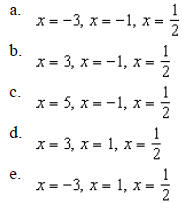
____ 30. Find all the real zeros of the polynomial

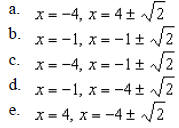
____ 31. Find all the real zeros of the polynomial

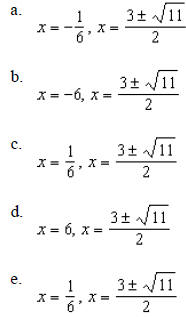
____ 32. Find all the real zeros of the polynomial

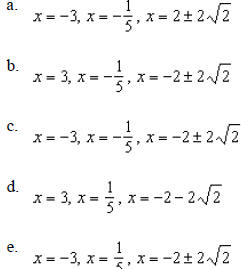
____ 33. Find all of the real zeros of the polynomial and
sketch its graph: 
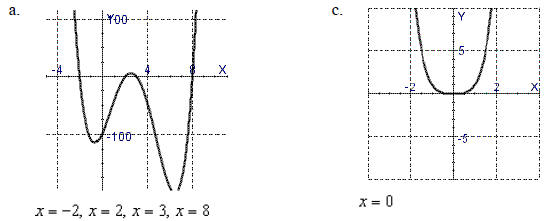
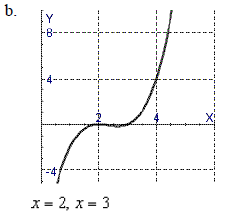
____ 34. Find integers that are upper and lower bounds for
the real zeros of 

____ 35. Find the real and imaginary parts of the complex
number 8 + 2i.
a. Real part 8, imaginary part 2
b. Real part 2, imaginary part 8
c. Real part 10, imaginary part i
____ 36. Evaluate the expression (4 + 9i)(11 – 10i) and
write the result in the form a + bi.

____ 37. Evaluate the expression
 and write the result in the form a + bi.
and write the result in the form a + bi.

____ 38. Evaluate the expression i 17 and write the result in the form a + bi.

____ 39. Evaluate the expression i 64 and write the result in the form a + bi.

____ 40. Evaluate the expression
 and write the result in the form a + bi.
and write the result in the form a + bi.

____ 41. Evaluate the expression
 and write the result in the form a + bi.
and write the result in the form a + bi.

____ 42. Find all solutions of the equation x 2 – 8 x + 25 = 0 and express them in the form a + bi.
a. x = 4, x = –4
b. x = 4 + 3i, x = 4 – 3i
c. x = 3 + 5i, x = 3 – 5i
d. No solutions
____ 43. Find all solutions of the equation
 and express them in the form a + bi.
and express them in the form a + bi.
a. z = 2 + 5i, z = 2 – 5i
b. No solutions
c. z = –4 + 2i, z = –4 – 2i
d. z = 4, z = –4
____ 44.  Factor P
completely.
Factor P
completely.
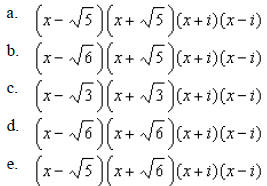
____ 45. Factor the  completely and find all its zeros. State the multiplicity of each zero.
completely and find all its zeros. State the multiplicity of each zero.
a. (multiplicity 1),
(multiplicity 1),
 (multiplicity 1)
(multiplicity 1)
b.  (multiplicity 2),
(multiplicity 2),
 (multiplicity 1)
(multiplicity 1)
c. 7 (multiplicity 2), –7 (multiplicity 2)
d.  (multiplicity 1),
(multiplicity 1),
 (multiplicity 1)
(multiplicity 1)
e.  (multiplicity 2), -
(multiplicity 2), - (multiplicity 2)
(multiplicity 2)
____ 46. Factor the polynomial
 completely and find all its zeros.
completely and find all its zeros.
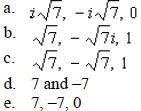
____ 47. Find the polynomial
![]() of degree 4 with
integer coefficients, and zeros
of degree 4 with
integer coefficients, and zeros  and 2 with
2, a zero of
and 2 with
2, a zero of
multiplicity 2.
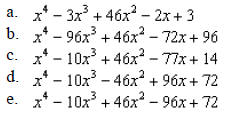
____ 48. Find the polynomial
![]() of degree 4, and
zeros
of degree 4, and
zeros
 and
and  ,
and constant coefficient 40.
,
and constant coefficient 40.
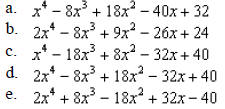
____ 49. Factor the polynomial
 completely into linear factors with complex
coefficients.
completely into linear factors with complex
coefficients.
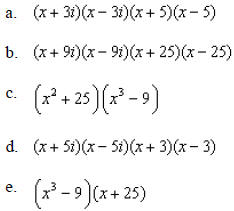
____ 50. Find the x- and y-intercepts of the rational
function 
a. x-intercept (6, 0), y-intercept (0, –1)
b. x-intercept (6, 0), y-intercept (0, –3)
c. x-intercept (1, 0), y-intercept (0, 6)
d. x-intercept (–1, 0), y-intercept (0, 6)
e. x-intercept (–6, 0), y-intercept (0, 0)
____ 51. Use transformations of the graph of
 to graph the rational function
to graph the rational function

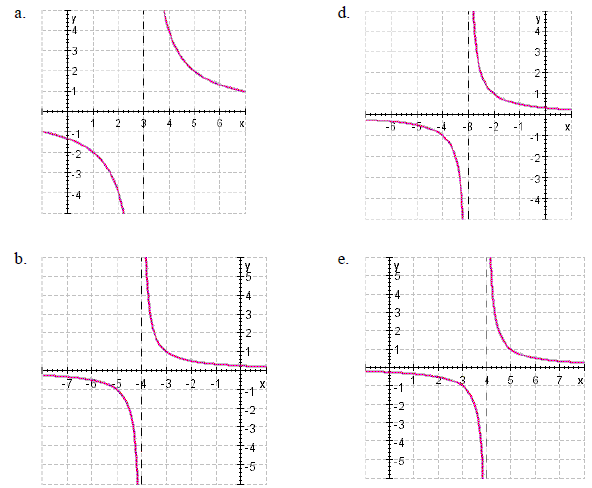
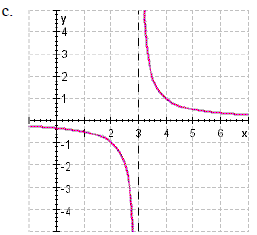
____ 52. Use transformations of the graph of
![]() to graph the rational
function
to graph the rational
function 
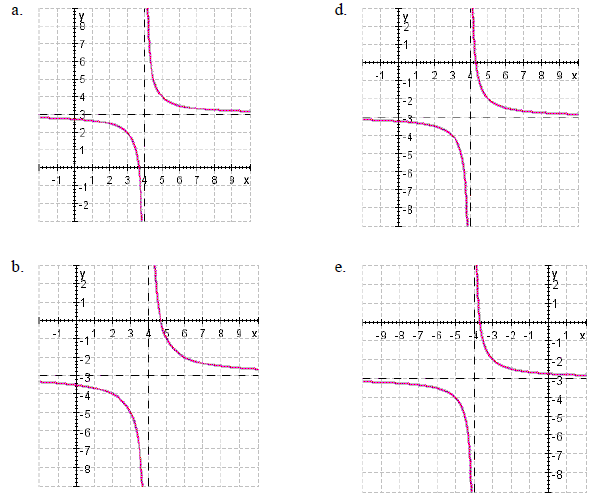
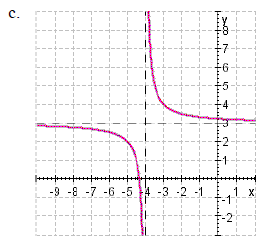
____ 53. Find the intercepts and asymptotes of the
rational function 
a.
| x-intercept | y-intercept | horizontal asymptote |
vertical asymptote |
 |
 |
 |
 |
b.
| x-intercept | y-intercept | horizontal asymptote |
vertical asymptote |
 |
 |
 |
 |
c.
| x-intercept | y-intercept | horizontal asymptote |
vertical asymptote |
 |
 |
 |
 |
d.
| x-intercept | y-intercept | horizontal asymptote |
vertical asymptote |
 |
 |
 |
 |
e.
| x-intercept | y-intercept | horizontal asymptote |
vertical asymptote |
 |
 |
 |
 |
____ 54. Determine the correct graph of the rational
function 
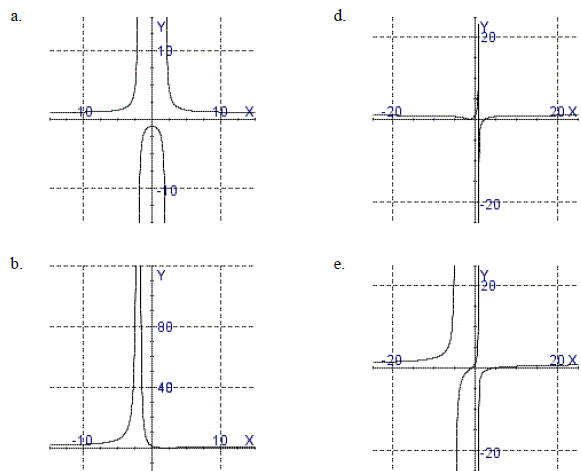
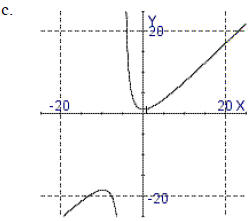
____ 55. Find the slant asymptote of the function


____ 56. Given the function,
 , identify another function with the same end
behavior.
, identify another function with the same end
behavior.

____ 57. Find a polynomial that has the same end behavior
as the rational function  .
.
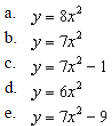
____ 58. Find a polynomial that has the same end behavior
as the rational function 
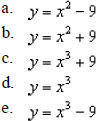
____ 59. The rabbit population on Mr. Jenkins' farm
follows the formula:
For this formula, t > 0 is the time in months since the
beginning of the year. What is the eventual population
of rabbits?
a. 4500 rabbits
b. 5750 rabbits
c. 5000 rabbits
d. 5500 rabbits
e. 6000 rabbits
____ 60. After a certain drug is injected into a patient,
the concentration C of the drug in the bloodstream is monitored.
At time t > 0 (in minutes since the injection), the concentration (in mg/L) is
given by the equation:
 What is the eventual
concentration of the drug?
What is the eventual
concentration of the drug?
a. 0 mg/L
b. 1 mg/L
c. 2 mg/L
d. 5 mg/L
e. 2.5 mg/L


